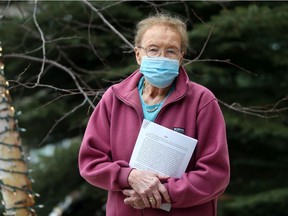15 months, 42 pages, and one Saskatoon woman's record of the pandemic
The 87-year-old's pandemic journal began when it was a faraway threat, and has continued to the present day.

Article content
Sylvia Chorney has bound 15 of the strangest months of her life within 42 typed pages.
The 87-year-old’s pandemic journal began when it was a faraway threat, and has continued to the present day, when the virus affects every home in Saskatchewan.
She started her first entry in January 2020, after celebrating Christmas with her daughters and discussing plans for them to return in the summer.
“That didn’t happen at all,” Chorney said. “I haven’t seen them in person since New Year’s Day morning.”
Since then, she’s written daily notes and added to the journal every month, creating a record of everything from the initial panic to the crisis in long-term care to the people who defied the rules.
“I made up my mind that I was not going to get down and depressed about being separated from everybody, and I began looking for other things that I could do,” Chorney said.
Chorney’s journal is one of hundreds of items that Saskatchewan residents have submitted to an archive at the University of Saskatchewan documenting the strange days we live in.
Erika Dyck, Canada’s research chair in the history of medicine and a professor at the U of S, is one of the professors who started it.
Dyck says the archive is a way of capturing history as it happens, and seeing how it compares to the past.
“There are some similarities,” Dyck said. “There’s fear, and panic, and anti-mask rallies and lockdowns ╤ some of these features are really common whether we’re talking about the 16th century or the 21st century.”

“So we thought: How can we stop forgetting these things?”
Anyone can contribute to the archive, which makes it less a manicured exhibit and more a string of other people’s memories. There’s a letter from someone who left Italy in the spring of 2020 and baked a cake for the first time in years, because they “felt the need for something sweet.” There are pictures of empty parking lots and airports, a screenshot of the emergency alert that blasted across phones in March 2020, and texts between someone and their mother in another province.
Chorney had a gut feeling the pandemic needed to be documented, even months before it knocked on Saskatchewan’s doorstep. She lives in Preston Park, a Saskatoon seniors housing building that she says has done an impressive job of keeping residents safe.
She remembers, at first, that the pandemic felt like a faraway thing.
“It started out with people making jokes about the Corona beer being the cause of this, or maybe the cure of it, and then it got not quite so funny,” she said dryly.
Now, it has affected nearly every facet of daily life. Chorney said she has kept busy not just through the journal but other tasks. She alphabetized Preston Park’s library, and watches concerts online with her daughters in Ontario and her granddaughter, who is an opera singer in Berlin. She says keeping busy has helped.
“I thought, ‘I’m not going to just sit here and hibernate,’ ” she said.
Chorney became passionate about writing when her granddaughter innocently asked if she had any hoop skirts and bonnets she could borrow for her Halloween costume. After explaining such things were worn 100 years before her time, Chorney joined a life story writing group at the University of Saskatchewan women’s club.
This isn’t her first epidemic. She was remembers a day when swimming pools were closed, gatherings were limited and movie theatres restricted entry because of the threat of polio. Two boys in her school caught it.
Dyck, who studies the medical history of the 20th century, believes memorializing events as they happen can be important, and even cathartic.
But time and time again, she says people have often forgotten about the experience of pandemics, perhaps out of a desire to get past it — a “tide of forgetting.”
“Initially there was the kind of novelty,” Dyck said. “Seeing empty streetscapes, or seeing Broadway (Avenue) empty, ‘closed’ signs, masks on statues. Things are different than what they used to be. And over time it’s become more about those human coping elements.”
Chorney said she hopes her journal can be a small part of helping future generations remember what happened in our times.
“I would hope that in the future there would be ways for the people in charge to really make sure that people did whatever it took to stop another pandemic.”
zvescera@postmedia.com
twitter.com/zakvescera
The news seems to be flying at us faster all the time. From COVID-19 updates to politics and crime and everything in between, it can be hard to keep up. With that in mind, the Saskatoon StarPhoenix has created an Afternoon Headlines newsletter that can be delivered daily to your inbox to help make sure you are up to date with the most vital news of the day. Click here to subscribe.








Postmedia is committed to maintaining a lively but civil forum for discussion. Please keep comments relevant and respectful. Comments may take up to an hour to appear on the site. You will receive an email if there is a reply to your comment, an update to a thread you follow or if a user you follow comments. Visit our Community Guidelines for more information.